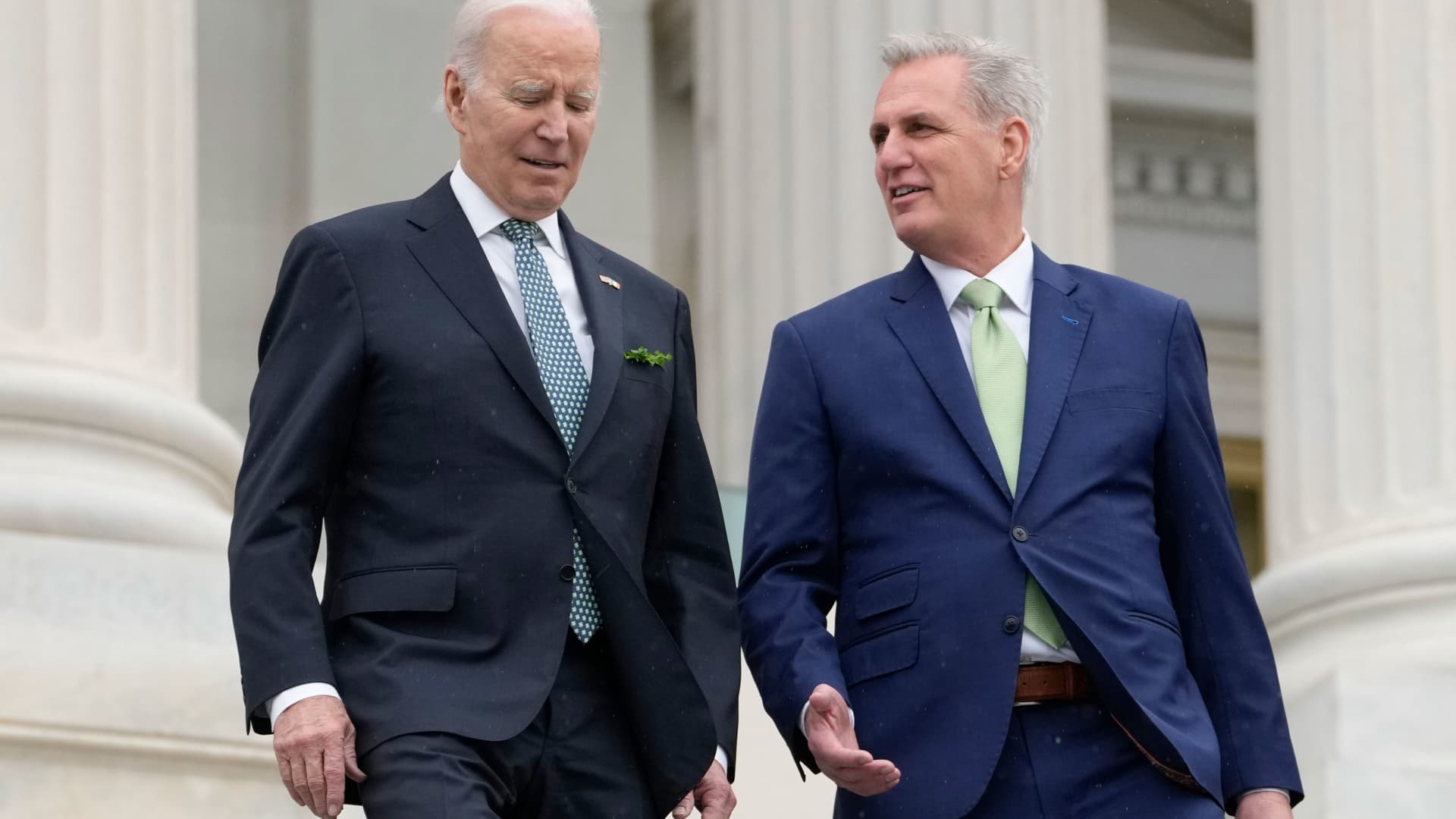WASHINGTON — House Republicans reached a tentative deal with the White House on Saturday night to address the nation’s borrowing limit and avoid a catastrophic default on U.S. sovereign debt.
Three Republican sources said there is a tentative agreement between Republicans leadership and the White House on a debt ceiling deal, and that the contours of the agreement will be relayed to GOP members on an all-member call happening shortly, according to NBC News.
A senior democratic aide familiar with negotiations told NBC News a deal is “very close” and could be announced as soon as tonight or tomorrow morning. Another democratic aide says “we are dotting the i’s and crossing the t’s.”
An all-member call for Democrats is currently not planned at this time but it is possible that a call gets scheduled tonight, according to one Democratic aide.
House Speaker Kevin McCarthy will give formal remarks at 9:10 p.m. ET. He and President Joe Biden spoke about three hours earlier.
The deal comes after more than a week of urgent talks between negotiators for the White House and House Republicans. It also marks the start of a lobbying blitz by House and Senate leaders in both parties to convince their members to vote for the package, which will need to win enough votes in the GOP-controlled House and Democratic-held Senate to raise the U.S. debt ceiling in time to meet a June 5 deadline.
At least one senator, Utah Republican Mike Lee, has already threatened to use procedural maneuvers in the Senate to hold up a debt ceiling bill for as long as possible if he doesn’t like what it contains.
In the House, a group of 35 ultraconservative members publicly pressured McCarthy to demand even more concessions from Democrats and to “hold the line.” They, too, indicated they would not support a deal that they thought gave too much away.
The announcement of a deal surprised official Washington, where members of both the House and Senate were out of town for Memorial Day. Biden left the city on Friday to spend the weekend at Camp David.
The agreement was all the more surprising in light of new guidance from the Treasury Department on Friday afternoon, which identified June 5 as the date after which the government would no longer have the funds to meet its debt obligations unless Congress raised the debt limit.
In announcing the June 5 date, Treasury Secretary Janet Yellen explained that the agency was ”scheduled to make an estimated $130 billion of payments and transfers” during the first two days of June. This would “leave Treasury with an extremely low level of resources.”
The week of June 5, Treasury will owe “an estimated $92 billion of payments and transfers,” Yellen wrote in a public letter to House Speaker Kevin McCarthy.
Unless the debt limit were raised in time and the government was allowed to borrow more, “Our projected resources would be inadequate to satisfy all of these obligations.”
A vote to raise the debt limit does not authorize additional government spending. It merely permits the Treasury to meet obligations that were already approved by Congress in the past, some of them, decades ago.
Nonetheless, many Republicans have come to view the biennial vote to raise the debt limit as an opportunity to extract concessions from Democrats in exchange for their votes to avoid a debt default.
This time around was no different. Republicans demanded that the White House agree to a bill that contained, at a minimum, baseline government spending cuts, new work requirements for public assistance, energy permitting reform and the rescinding of unspent Covid emergency funds.
The White House initially balked at many of these, and negotiators spent the past two weeks trying to come up with a compromise that could garner enough support to pass in the House and Senate.
“It’s not over. We’re not done. But we’re within the window of being able to perform this and we have to come to some really tough terms in these closing hours,” GOP negotiator Rep. Patrick McHenry of North Carolina told reporters late Friday afternoon.
McHenry said he appreciated the additional guidance from Yellen, calling the Treasury secretary “a woman of principle” who had been “very respectful” of Republicans throughout the months long debt ceiling standoff.
“In many respects, it’s an answer to what House Republicans were questioning about the X date. Now we know, and this puts additional pressure on us.”
This is a breaking news story. Please check ack for updates.
